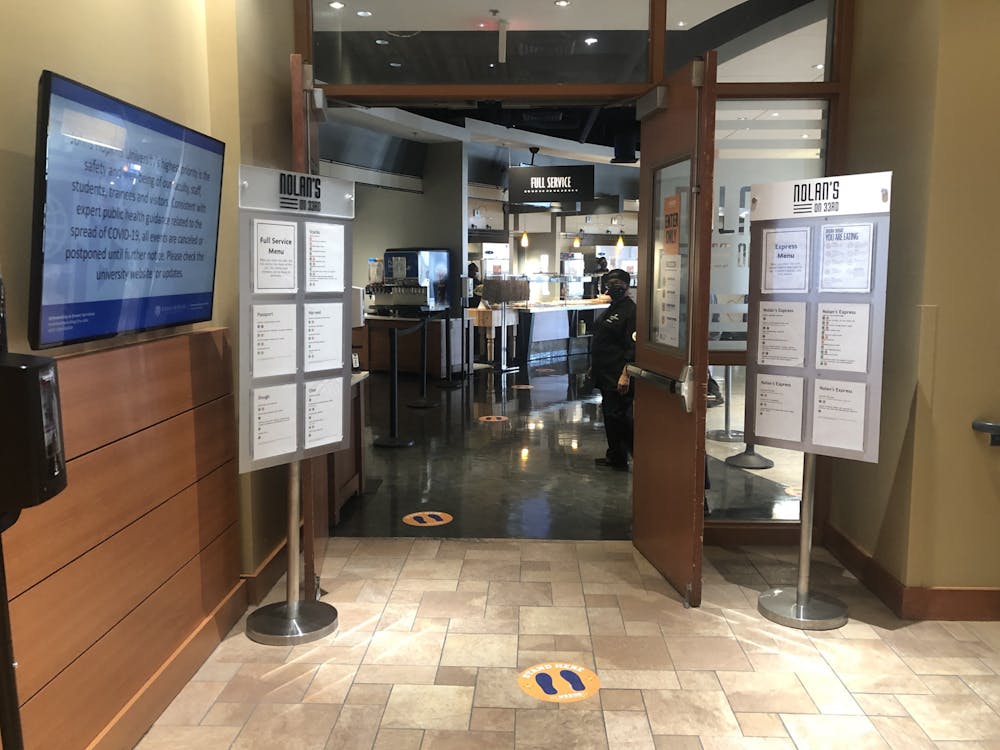The dining experience for students living on-campus has been adapted to adhere to social-distancing guidelines due to the coronavirus (COVID-19) pandemic.
Nolan’s on 33rd, normally open only for dinner service, now serves three meals a day to the few students living in on-campus housing. Operations run from 7 a.m. to 9 p.m., with break periods in between service to sanitize.
In an interview with The News-Letter, Senior Manager of Dining Programs Ian Magowan explained that various safety precautions have been implemented to prevent the spread of COVID-19.
“We wanted to eliminate as many touch points as possible. At the entrance we give all students bags for their food that already have silverware in them,” he said. “All lines are long and singular, all condiments are prepackaged and all food is handed to them.”
Seats have been removed from Nolan’s, and typical full food service is offered only as takeout. Pre-packaged items, akin to the Meals-in-a-Minute program at Charles Street Market (CharMar), are also offered as grab-and-go items through a separate express line.

COURTESY OF CHRIS H. PARK
Upon entering, students can choose between the typical full service and a grab-and-go option.
Freshman Sarah Annis expressed satisfaction with the amount of food she can take in a single trip.
“They’ve been really generous with how much food for takeout, which is really nice,” she said.
Freshmen Sai Dharmasena and Christin Hardee appreciate the quality of menu items. All previous mainstays of protein, starch, vegetables and grill station items continue to be served.
Dharmasena feels that her dietary restrictions are adequately accommodated by the University.
“I’m vegetarian, and they do a really good job of offering a lot of selections, especially on Mondays where there is no meat,” she said.
Hardee added in an email to The News-Letter that she enjoys the variety of options offered at Nolan’s.
“I’ve gotten to try some really good food that I’ve never tried before,” she wrote.
Students choosing the full food service lane will pick up a bag at the beginning of the line. They will then ask the dining staff standing behind the service counter with a box to pack their desired menu item. There is no self-service, and students must social distance and follow the floor decals laid six feet apart.
Additional safety measures have been put in place for the dining staff. There are 7.5-foot separations between chef stations as well as temperature checks and hand washing logs to monitor hygiene.
Regular COVID-19 testing, however, is not a part of the operation.

COURTESY OF CHRIS H. PARK
Students can purchase items typically found in CharMar at the Mini-Market using Dining Dollars.
Toward the back of Nolan’s — where the ice cream fridge was previously located — is a miniature recreation of CharMar called the Mini Market. Students can use Dining Dollars to purchase goods similar to those typically sold at CharMar.
Freshman Christine Olivia voiced concerns about a lack of notice regarding the shelf life of the food products.
“There’s really no transparency about expiration dates, when certain food is made or meant to be sold,” she said. “I’m not sure by when I should throw away the produce or eat certain dishes.”
Dining operations at peer institutions
Since the beginning of fall semester, students at several universities, including New York University (NYU), have reported being served subpar meals during the mandatory 14-day quarantine. Hopkins, however, did not have a quarantine policy for students who decided to live in University housing.
Some students, though, had been or currently are under quarantine due to either contracting COVID-19 or having meaningful contacts with those who tested positive. Those students were not allowed to go to Nolan’s. Instead, the University dropped off meals in front of their doors.
Hardee, who had to self-isolate, stressed the quality of these meals.
“They dropped a bag of food off at my door around 10 a.m. everyday with three meals and a lot of snacks and drinks,“ she wrote. “The meals were actually pretty good, and there was a wide variety of meals that they brought.”
Annis stated that dining experiences at other universities made her concerned about how Hopkins would cater to the dining needs of students on-campus.
“What we saw at NYU was a little concerning,” she said. “At Hopkins, we were never forcibly quarantined, so I wasn’t really worried, especially since there’s only 50 to 60 of us.”
Dharmasena had a similar attitude to Annis before arriving but noted that the lack of a quarantine policy relieved her worries.
“I saw the NYU stuff on social media and I was worried because I didn't know what the food situation would be like at Hopkins,” she said. “It turned out to be okay — a lot of it was that we could pick our own food rather than having something delivered to us.”
Magowan explained that the changes made due to the cancellation of in-person classes gave the University an opportunity to experiment.
“A lot of the stuff we’re doing is new for us,” he said. “It is a contract renewal year, so we are using this to test out some things as a sort of incubator.”





